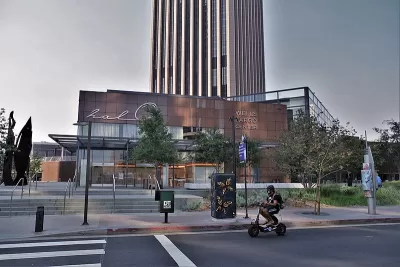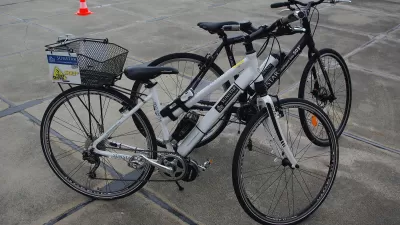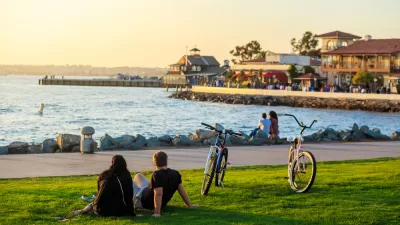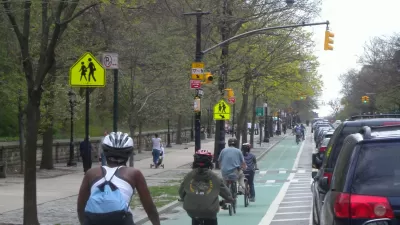A new e-bike credit, if coupled with improved bike safety infrastructure, could encourage many Americans to replace short car trips with e-bike rides, reducing emissions and congestion.

In an article for Streetsblog, John Stout writes that "it’s clearer than ever that we need to do everything in our power to mitigate our country’s impact on the climate crisis," and e-bikes may be one powerful tool for doing so. And, as it turns out, they're getting some support in the bipartisan infrastructure package and budget reconciliation.
"In a nod to the nascent American 'bike boom,' which saw e-bike sales triple in 2020, as COVID-19 lockdowns forced many to stay home and those still commuting to grow weary of using public transit, the multi-trillion dollar Build Back Better legislation includes a whopping $7.4 billion measure for e-bikes," translating into as much as $750 in credits for e-bike purchases.
But while "making e-bikes more affordable is key to increasing adoption, many would-be riders are still too fearful to take to the streets on two wheels because of safety concerns on our country’s car-centered roadways." The infrastructure legislation takes this into account and "would push federal regulators to better account for the safety of not only drivers, but also cyclists and pedestrians."
Stout argues that "if we provide Americans with the right tools, we can make biking a viable option by making it easier for people to replace shorter car trips with bike trips." But Congress must take action to "rally behind the bipartisan infrastructure and reconciliation legislation. By passing these two historic climate bills, the federal government can ensure that cyclists can ride safely on our roadways and ensure that all Americans can afford new road-ready e-bikes."
FULL STORY: OPINION: E-bikes Could Become a Weapon Against Climate Change

Study: Maui’s Plan to Convert Vacation Rentals to Long-Term Housing Could Cause Nearly $1 Billion Economic Loss
The plan would reduce visitor accommodation by 25,% resulting in 1,900 jobs lost.

North Texas Transit Leaders Tout Benefits of TOD for Growing Region
At a summit focused on transit-oriented development, policymakers discussed how North Texas’ expanded light rail system can serve as a tool for economic growth.

Why Should We Subsidize Public Transportation?
Many public transit agencies face financial stress due to rising costs, declining fare revenue, and declining subsidies. Transit advocates must provide a strong business case for increasing public transit funding.

How to Make US Trains Faster
Changes to boarding platforms and a switch to electric trains could improve U.S. passenger rail service without the added cost of high-speed rail.

Columbia’s Revitalized ‘Loop’ Is a Hub for Local Entrepreneurs
A focus on small businesses is helping a commercial corridor in Columbia, Missouri thrive.

Invasive Insect Threatens Minnesota’s Ash Forests
The Emerald Ash Borer is a rapidly spreading invasive pest threatening Minnesota’s ash trees, and homeowners are encouraged to plant diverse replacement species, avoid moving ash firewood, and monitor for signs of infestation.
Urban Design for Planners 1: Software Tools
This six-course series explores essential urban design concepts using open source software and equips planners with the tools they need to participate fully in the urban design process.
Planning for Universal Design
Learn the tools for implementing Universal Design in planning regulations.
Ascent Environmental
Borough of Carlisle
Institute for Housing and Urban Development Studies (IHS)
City of Grandview
Harvard GSD Executive Education
Toledo-Lucas County Plan Commissions
Salt Lake City
NYU Wagner Graduate School of Public Service





























